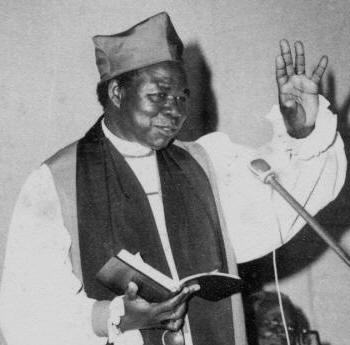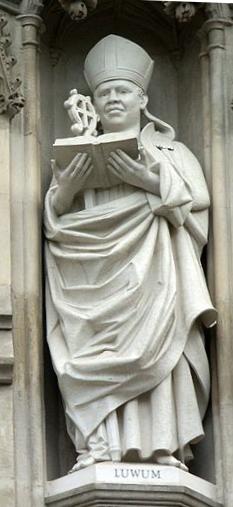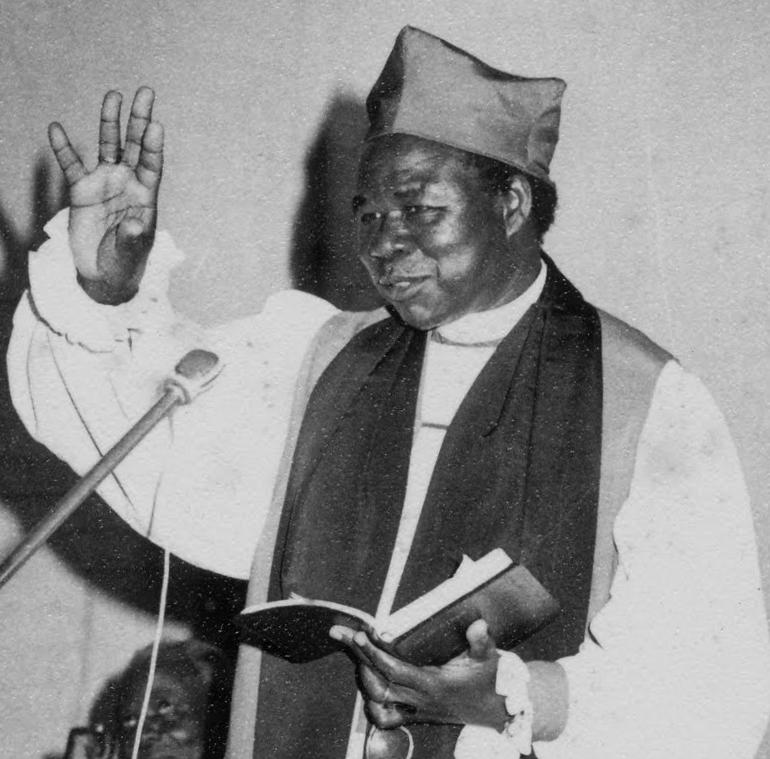Sunday February 16, 2014 - Christians,
especially those of the Anglican Communion remember the life
and death of one of the ten 20th century martyrs
commemorated with statues at Westminster Abbey in
London. Archbishop Janani Luwum of Uganda, a
leading voice in criticising the excesses of the Idi
Amin regime that assumed power in 1971 was murdered
today thirty seven years ago.
  According to a Trust named in his honour the Most Reverend Janani Luwum was the sitting Archbishop of Uganda, Rwanda, Burundi and Boga Zaire when Dictator Idi Amin murdered him on February 16, 1977. He exercised exceptional and courageous leadership when he opposed Idi Amin's regime of tyranny, gross human rights violations and "islamisation" agenda in Uganda. The vibrant Anglican Church of Uganda under his leadership was on the verge of centennial celebrations of its birth through the seed of the blood of the Ugandan Martyrs. Thus Luwum became the first martyr of the second century of Christianity in Uganda. The Church of England, the mother church of the Anglican Communion, has recognised and honoured him among 20th century martyrs as Africa's Martyr. His death is commemorated on the 17th of February, his statue stands on the front of Westminster Abbey in London and a chapel has been dedicated to him in Canterbury Cathedral. The murder of the Archbishop did not come as a surprise to many given Idi Amin's fervour in dispatching all those he believed opposed his rule, all those whom he suspected were not willing to walk the path of murder and mayhem that he had created in a Uganda with a long history of association with Christianity. Archbishop Luwum knew what was at risk when on 16th February, he and other church leaders presented a petition to Idi Amin condemning the many instances of extra-judicial killings as well as disappearances that had become rampant in Idi Amin's Uganda. Even though he knew the risks, he did not flinch from his responsibility and spoke truth to power. Those who were surprised by the murder of Archbishop Luwum had believed, given the Archbishop's position in society, that Idi Amin would not dare raise a finger against the man of God, more so to execute him. They were proved wrong. Born in 1922 at Mucwini in the Kitgum District of Uganda, Janani Luwum spent his childhood and early youth tending goats, but earned a reputation as a quick learner when opportunities arose. He became a teacher and, on January 6 1948, was converted to Christianity. At once he turned evangelist, warning against the dangers of drink and tobacco, and, in the eyes of local authorities, disturbing the peace. In January 1949 Luwum went to a theological college at Buwalasi, in eastern Uganda. He became a deacon in 1955 and was ordained a priest in 1956. He served in the upper Nile Diocese of Uganda and the Diocese of Mbale, and was consecrated Bishop of Northern Uganda in 1969 and Archbishop of Uganda in 1974, three years after Idi Amin came to power in a military coup. He participated at
the Lausanne International Congress on World
Evangelisation (LICWE) in Switzerland in
1974, the year he was elected archbishop,
even as he had also been a member of the
Central Committee of the World Council of
Churches (WCC). Ghanaian born
Methodist (now Anglican Canon) Kodwo Ankrah
who worked with him as the founding
Coordinator of the Planning, Relief and
Development arm of the Church of Uganda
testifies of his vision and entrepreneurial
leadership: "Luwum made it abundantly clear that the Church itself must be educated to move away from its continued dependence on external support, and be able in a reasonable period of time, to contribute equitably to the ecumenical mutual schemes and programmes. So he requested that all incoming students to Mukono Theological College should be taught Development Studies... to broaden the understanding of the future Church workers and leaders in matters of the economy and in factors contributing to economic decline in Africa, and in Uganda in particular... Luwum in his thinking was almost two decades ahead of many Church leaders in East Africa." Easily the best demonstration of Luwum's abiding legacy could be the many young leaders he identified, developed and mentored to become global leaders today. Two stand out prominently: The Most Reverend Henry Luke Orombi, Archbishop of the Church of Uganda and Ugandan-born first black full bishop of the Church of England, The Most Reverend & Right Honourable Dr. John Sentamu, Lord Archbishop of York. Archbishop Orombi was a schoolteacher and lay preacher in Lira, present day Lango Diocese in Northern Uganda, when Luwum, then bishop, spotted his talent and brought him to work in the diocese as Assistant Diocesan Religious Education Advisor/Youth worker in 1973. He then sent him for theological training to Bishop Tucker College, Mukono after which Orombi got a scholarship for further studies at St. John's College, Nottingham. He was enthroned Archbishop of the Church of Uganda on January 25th, 2004, "co-incidentally" the same day Luwum was enthroned archbishop thirty years ago.
The arrest, interrogation,
torture and murder of Archbishop Luwum rings a bell with
many living in countries where fear reigns supreme and
where the security forces as well as high-placed
officials of government and ruling party cadre are never
brought to justice even though implicated in the murder
of people believed to have a view which exposes the evil
in government.
What is happening in Sierra Leone under the rat passing himself off as a PhD holder bears testimony to this and should serve as a warning to all those who minute after minute lie in quivering supplication at the altar of his ill-gotten private as well as the country's resources with a view to having a slice of the cheese the rat and his kind keep feeding on even though they know deep in their hearts that one fine day, there will be a time of reckoning. Power-drunk Idi Amin, after pressure from certain sections of the public in Uganda and outside the country released the body of the murdered Archbishop for burial in a sealed coffin. Despite the presence of spies and those wanting to gain favour with Idi Amin, the coffin was opened - to reveal the bullet-riddled body of a man Idi Amin had told the people, died in a road accident while trying to overpower the driver of the military vehicle that was taking him and others to an interrogation centre!!!! Janani Luwum was survived by a widow, Mary Lawinyo Luwum and nine children. He was buried at his home village of Mucwini in the Kitgum District. He is recognised as a martyr by the Church of England and the Anglican Communion and his death is commemorated on 17 February as a Lesser Festival. His statue is among the Twentieth Century Martyrs on the front of Westminster Abbey in London. The AFRC/RUF coalition of evil, otherwise known as the beasts, also tried their hand at this kind of deception in early September, 1997 when the people of Mabaylla in the east of the capital Freetown were subjected to murderous fire from the guns of rogue soldiers and rebels of the Foday Sankoh killers in a new outfit called the Peoples' Army. Those who died that night of September 3-4 1997 had bullet wounds as well as those inflicted by blasts from rocket propelled grenade launchers - the type favoured by the killers working for the regime. It is also worth reminding all and sundry that the key planners and of the Mabaylla murders as well as those who squeezed the triggers that caused so much pain and suffering to the people of Mabaylla are still retained, maintained and supported by the rat who has made it quite clear that the lives of Sierra Leoneans are cheap and that no one would be held to account - not even after in his smoke and mirrors act, he sets up an inquiry!!! On this day, we join Anglicans and people of similar faiths and beliefs all over the world in remembering the life of Archbishop Luwum with prayers that the Good Lord in His wisdom will grant him the rest only He can. R I P |

